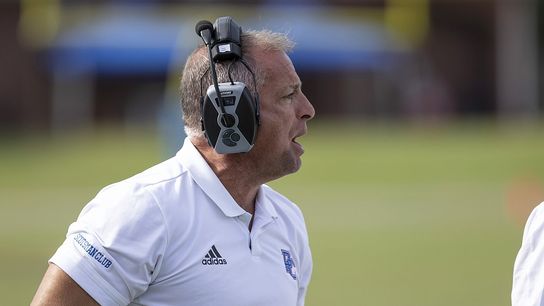Before we go any further, Kevin Kelley would like to get one thing straight. He's not The Coach Who Never Punts, he's The Coach Who Rarely Punts, the Coach Who Punts When It Makes Sense.
In fact, he can tell you the exact situation that led to his last two punts. The most recent was in a state championship game when he had the ball near midfield and punting would've forced his ground-based opponent to travel 60 yards in close to a minute. The second most recent saw the risk-reward graph stacked even more heavily toward risk -- 4th-and-3, in his own territory, with just nine seconds left in the first half.
So it's not just that he flat refuses to punt. It's that the numbers need to talk him into it, and they need to be pretty darn convincing. For instance, on a 4th-and-5 from his own 6-yard line, Kelley might go for it.
Or at least he would paint a picture, in a radio interview conducted in the middle of May, why going for it makes logical sense.
"When you should put is more between your 40 and 50. If it's say, 4th-and-5 from your own 6, you're gonna tight punt back there. If you turn the ball over there (from your own 6-yard line), they're going to score about 91, 92 percent of the time. If you punt it out of there, you've got to do tight punt, you've got to protect the punter instead of go cover, you don't try the rugby style -- you're going to net 30, 34 yards and they're going to score almost 80 percent of the time anyway," he told KTCK-FM in Dallas on Wednesday. "So you're only giving up 12-15 percentage points with a chance on 4th-and-5 to make it. The actual numbers say you shouldn't punt there, you should go for it.
"Now everybody thinks that's crazy and nobody's going to do it, but that's what it really is. In that regard, I'm just going to weigh those in. I don't know how much I expect to punt next year, but I know it's going to be a whole lot less than anybody else in the world probably does."
(For the record, in 2019, the last full season on record, Davidson booted the fewest punts in FCS with 14 in 12 games. Presbyterian punted 60 times over the course of their 2-10 season.)
Talking yourself through it in May is one thing. Actually doing it in a tight game in November is another thing entirely, and only time will tell what Kelley opts to do.
Still, Kelley believes that even the threat of going for it on fourth down makes life easier for his offense on first through third downs. A defense may be less likely to throw a go-for-broke blitz at him on third down knowing that even a sack may not necessarily get them off the field.
"You literally take what the defense gives you," he said. "If we run the ball on 3rd-and-10, I'm attacking the weakness of the defense and it might give me a first down. Whatever the numbers do say, they don't take into consideration the time the defense might spend preparing (for defending an extra down) and that's something that nobody thinks about," Kelley said.
In addition to the schematic benefits of his never-say-die offensive strategy, Kelley also saw psychological benefits through the years at Pulaski Academy that he'd like to bring with him to Presbyterian.
"I did a self-study from three years of us at how often we scored from different parts of the field. Once we make it to the other team's 40-yard line on 1st-and-10, just a regular drive, no fourth downs, how many plays did it take us to score on average? And then I looked if we were on the same spot on the field after we converted a fourth down and it cut the number of plays in half," he said. "Some of that is me calling it more aggressive and treating it like a turnover. I attribute a lot of it to the psychology of the other coach, they're all pissed off because they shouldn't even be out there, they're yelling at their guys because they gave up a fourth down conversion, those guys are pissed off because their coach is yelling at them, and they look up and we're running a play and they don't even have time to get their thoughts back together."
There will be times when the game gives Kelley no other choice but kicking it to his opponent. And when that happens, it'll probably be his quarterback doing the kicking.
"If he can play college or high school quarterback," he said, "he can put his foot on the ball and make it roll backwards."
